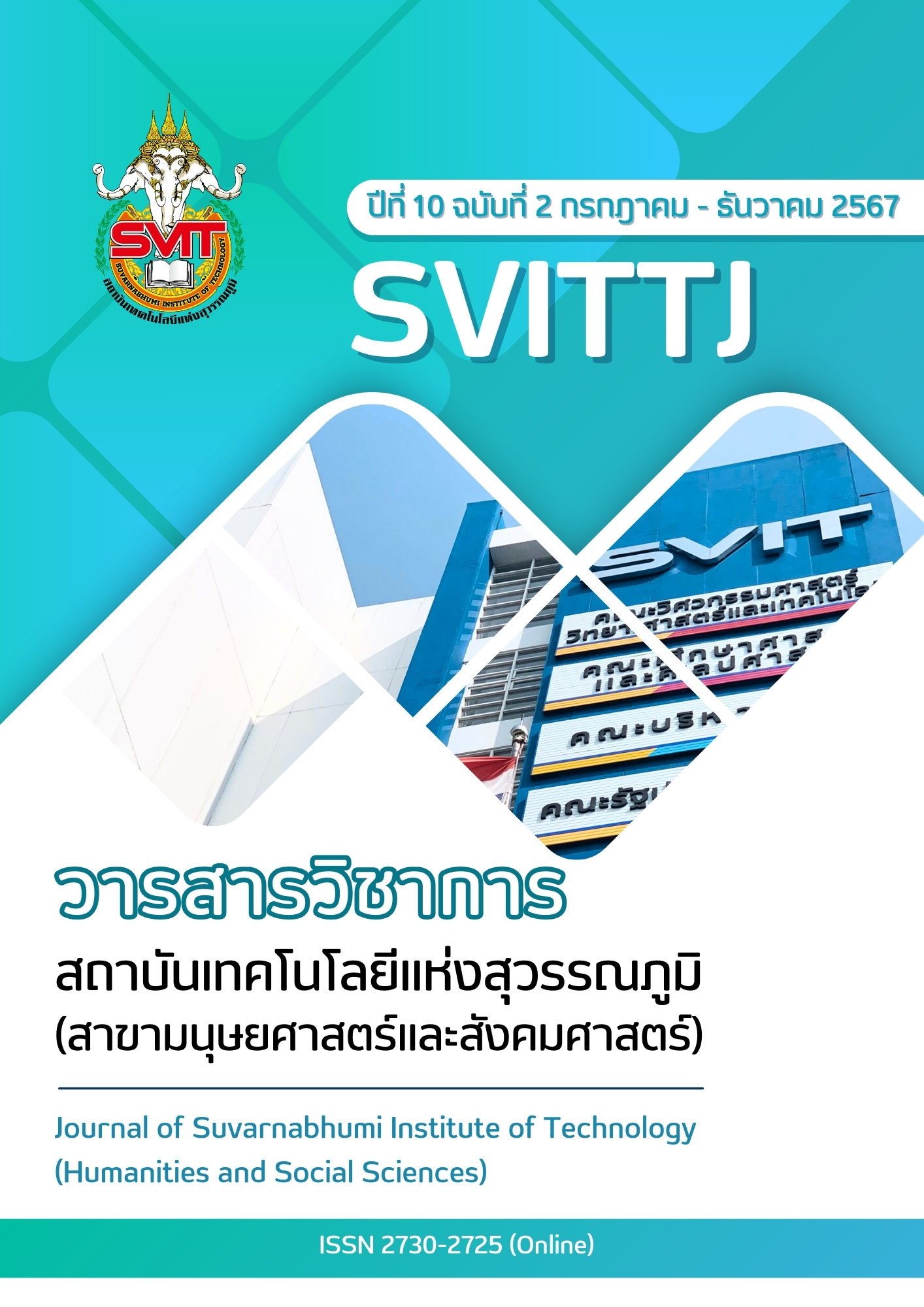THE RELATIONSHIP BETWEEN EMOTIONAL INTELLIGENCE WORK ENGAGEMENT AND EMPLOYEE SERVICE PERFORMANCE WORKING IN THE HOTELS IN CHONBURI
Keywords:
Emotional Intelligence, Work Engagement, Service PerformanceAbstract
This research aims to investigate the relationship between emotional intelligence work engagement and service performance of front-line employees working in 3-star and above hotel businesses in Chonburi. Using a theoretical sampling method and semi-structured interview approach, data collection was conducted through in-depth interviews, using traditional content analysis, coding, data types, and main points. The results of the research found that emotional intelligence and work engagement were positively related to employees’ service performance. Emotional intelligence helped employees express service behaviors that impressed customers, while work engagement factors led to employees’ enthusiasm, dedication, and pride in their work, leading employees to provide services with happiness. The results of the research indicated that emotional intelligence and work engagement have a positive relationship with employee service performance. Therefore, executives and supervisors should focus on developing emotional intelligence and work engagement to gain a competitive advantage.
References
จําเนียร จวงตระกูล และนวัสนันท์ วงศ์ประสิทธิ์. (2019). การวิเคราะห์เนื้อหาในการวิเคราะห์ข้อมูลการวิจัยเชิงคุณภาพ. PAAT Journal (วารสารสมาคมรัฐประศาสนศาสตร์แห่งประเทศไทย), 1(2), 9-22.
พุทธชาด ลุนคำ, (2565). แนวโน้มธุรกิจ/อุตสาหกรรม ปี 2565 – 2567: ธุรกิจโรงแรม. สืบค้นจาก https://www.krungsri.com/getmedia/aa9cf904-6514-4a14-a260-b24e2f7f6754/IO_Hotel_221125_TH_EX.pdf.aspx
Biron, M., & Van Veldhoven, M. (2012). Emotional labour in service work: Psychological flexibility and emotion regulation. Human relations, 65(10), 1259-1282.
Bowen, D. E., & Schneider, B. (1988). Services marketing and management-implications for organizational-behavior. Research in organizational behavior, 10, 43-80.
Carter, N., Bryant-Lukosius, D., DiCenso, A., Blythe, J., & Neville, A. J. (2014). The use of triangulation in qualitative research. Oncology nursing forum, 41(5), 545–547.
Charmaz, K. (2012). The power and potential of grounded theory. Medical sociology online, 6(3), 2-15.
Cognard, (2019). Drivers-of-change-in-hospitality. Retrieved from https://amadeus.com/en/newsroom/press-releases/drivers-of-change-in-hospitality
Creswell, J.W. and Creswell, J.D. (2018) Research Design: Qualitative, Quantitative, and Mixed Methods Approaches. Sage, Los Angeles.
Dakhoul, Z. M. (2018). The determinants of employee performance in Jordanian organizations. Journal of Economics Finance and Accounting, 5(1), 137-143.
Jeung, D. Y., Kim, C., & Chang, S. J. (2018). Emotional labor and burnout: A review of the literature. Yonsei medical journal, 59(2), 187-193.
Jewell, L.N. & Siegall, M (1990). Contemporary industrial and organizational psychology. (2nd ed). MI: West Publishing Company.
Kim, A., Kim, Y., Rhee, J., Lee, S., Jeong, Y., Lee, J., & Park, J. (2022). A study on emotions to improve the quality of life of South Korean senior patients residing in convalescent hospitals. International Journal of Environmental Research and Public Health, 19(21), 14480.
Khanguraa, G. S., Kaurb, B., & Rana, V. S. (2023). Analysing the Impact of Emotional Intelligence on Performance of Employees Working in Star Category Hotels of Chandigarh. Journal of Management and Entrepreneurs, 17(1), 159-183
Knežević, M. N., Petrović, M. D., Kovačić, S., Mijatov, M., Vuković, D. B., & Kennell, J. (2021). Acting the part: Emotional intelligence and job satisfaction as predictors of emotional labor in travel agencies. Tourism and Hospitality Research, 21(2), 183-201.
Liao, H., & Chuang, A. (2004). A multilevel investigation of factors influencing employee service performance and customer outcomes. Academy of Management Journal, 47(1), 41-58.
Moopayak, K., Udomphanthurak, J., Kanyapattanapron, C., Sangchan, C., & Kaesornsamut, P. (2015). Correlation between emotional intelligence and adaptive behaviors of nursing students. Nursing Science Journal of Thailand, 33(1), 55-65.
Onyeonoro, C.O, Anyanwu, D. E., Ohwobevughe, F. U., Onyeonoro, F. N., (2023). Emotional Intelligence and Hotel Employee Work Behaviour: Moderating Role of Age. European Journal of Hospitality and Tourism Research, 11(2), 49-72.
Sahmuddin, S., Siregar, Z. M. E., & Hanum, F. (2022). The Influence of Emotional Intelligence, Job Satisfaction, and Work Engagement on the Performance of Employees in the Labuhanbatu Regency’s Youth, Sports, Culture, and Tourism Services. Indonesian Interdisciplinary Journal of Sharia Economics (IIJSE), 5(2), 936-949.
Sayed, Z., Proches, C. N. G., & Sayed, Z. (2021). Exploring the Role of Emotional Intelligence in the Customer Service Industry. Gender and Behaviour, 19(1), 17676-17695.
Schaufeli, W. B., Salanova, M., González-Romá, V., & Bakker, A. B. (2002). The measurement of engagement and burnout: A two sample confirmatory factor analytic approach. Journal of Happiness studies, 3, 71-92.
Singh, J., Verbeke, W., & Rhoads, G. K. (1996). Do organizational practices matter in role stress processes? A study of direct and moderating effects for marketing-oriented boundary spanners. Journal of marketing, 60(3), 69-86.
Sukhragchaa, A., Munkhuu, B., & Lkhamtseden Badarch, L. (2021). Impact of Hotel Employee’s Emotional Intelligence on Emotional Labor and Job Satisfaction. Jurnal Ilmiah Peuradeun, 9(3), 743-764.
Sumaneeva, K. A., Karadas, G., & Avci, T. (2021). Frontline hotel employees’ proactive personality, I-deals, work engagement and their effect on creative performance and proactive customer service performance. Journal of Human Resources in Hospitality & Tourism, 20(1), 75-100.
Şahin, F., & Işık, D. A. (2020). Service Employee’s Emotional Intelligence and Customer’s Evaluations of Service Quality in Hospitality Industry. Journal of Advanced Management Science, 8(2).
Utin, N. H., & Yosepha, S. Y. (2019). The model of employee performance. International Review of Management and Marketing, 9(3), 69.
Yin, R. K. (2018). Case study research and applications: Design and methods (6th ed.). Thousand Oaks, CA: Sage.
Downloads
Published
Issue
Section
License
Copyright (c) 2024 Suvarnabhumi Institute of Technology

This work is licensed under a Creative Commons Attribution-NonCommercial-NoDerivatives 4.0 International License.
บทความที่ได้รับการตีพิมพ์เป็นลิขสิทธิ์ของวารสาร Sarasas Journal of Humanities and Social Science ข้อความที่ปรากฏในบทความแต่ละเรื่องในวารสารวิชาการเล่มนี้เป็นความคิดเห็นส่วนตัวของผู้เขียนแต่ละท่านไม่เกี่ยวข้องกับสถาบันสารสาสน์เทคโนโลยีแห่งสุวรรณภูมิแต่อย่างใด ความรับผิดชอบองค์ประกอบทั้งหมดของบทความแต่ละเรื่องเป็นของผู้เขียนแต่ละท่าน หากมีความผิดพลาดใดๆ ผู้เขียนแต่ละท่านจะรับผิดชอบบทความของตนเองแต่ผู้เดียว



